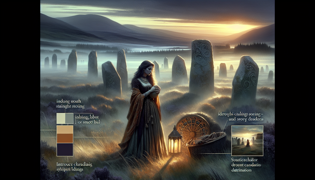Stolen Bairn and the Sìdh: A Scottish Folktale of Courage
Reading Time: 9 min

About Story: Stolen Bairn and the Sìdh is a from united-kingdom set in the . This tale explores themes of and is suitable for . It offers insights. A Scottish folktale about a mother's fierce determination to rescue her child, stolen by the mystical Sìdh, showcasing themes of love and bravery in a magical setting.
Introduction
Ailsa’s cottage stood at the very edge of the heathered moor. Each dawn she’d cradle her bairn close, humming lullabies older than the hills. One night, beneath an ink-black sky freckled with starlight, an eerie hush fell. The peat-smoke scent lingered in the air as curling tendrils of mist crept across the turf like silent ghosts. Then came the softest rustle, like a thousand moths beating their wings in unison. When Ailsa awoke, the cradle lay empty. Heart hammering, she caught only a faint echo of laughter riding the breeze—a sound both sweet and sorrowful.
Panic flared in her chest. She recalled tales told by the bothy fire: of Sìdh folk who pilfered wee children with velvet feet and eyes aglow like fireflies. Local folk whispered that no iron could bind their doors, no prayer could bar their flight. But Ailsa’s resolve was steel. She would pursue them into their hidden realm, no matter how deep the shadows or far the road.
A single line of moonlight guided her path. The wind sighed in ancient oaks, and the hum of unseen wings brushed her cheek. With cloak drawn tight, she steeled herself. If love could be a lantern in darkest night, hers would never dim. With one last glance at the empty cradle, she stepped forward, determination blooming like a gorse-fire along the ridge.
1. The Vanishing
Under the silver gaze of the moon, Ailsa retraced her steps along the peat track. The heather smelled rich and damp, like old parchment, and the wind carried a low moan. Each hoofprint and broken twig felt charged with faerie magic. She stopped by a ring of ancient stones, their surfaces shimmering with dew. Soft laughter drifted through the rocks, a tune as sweet as honey yet edged with sadness. With a trembling voice, she called her bairn's name. Silence answered. Then came a soft glow between two standing stones—pale as new milk. It pulsed like a wounded heart. Ailsa pressed her palm to the stone's cool surface; it felt alive, thrumming with energy.
Memories of old sayings rose in her mind: “Never follow a faerie song, or ye’ll wander beyond yon horizon.” But she could not turn back. Hope and fear tangled like brambles. She plunged through the stone circle and felt the air shift, heavy with sparkling motes that stung her eyelids. The moor changed beneath her feet, soft as velvet moss. Despite cold sweat on her brow, she strode onward, guided by that faint laughter.
Partway through the circle she stumbled on a tiny harp carved from moonbeam and bone. Strings hummed with a siren’s promise. Ailsa halted, recalling the warning whispered in hushed tones by the old crone in Hollow Glen: ‘The Sìdh delight in cunning. Trust your heart, not your eyes.’ Clutching the harp, she shivered as a swirl of lights carried her deeper into faerie lands.
A sudden gust brought the scent of apple blossom and mould, as though an orchard lay hidden behind the fog. Her cloak billowed like a raven’s wing and the lights winked out. In the absolute hush that followed, she heard but one heartbeat—her own.
Sensory detail: The path’s turf felt spongy underfoot; distant drip of unseen water; faint tang of wild rose in the air.

2. The Path through the Feywood
Beyond the stones, the landscape shifted to gnarled trees whose branches wove like skeletal fingers. Moss dripped from their trunks in emerald strands, and the air tasted faintly of honeyed rot. Each step yielded a soft crunch of fallen pine needles. Owls hooted somewhere far above. Deep gloom reigned, yet flecks of silver moonlight flickered through the boughs.
Ailsa tightened her grip on the small harp. It pulsed against her side, each vibration like a heartbeat. She recalled the crone’s final counsel: “To cross faerie wood, speak no false word. Offer a gift pure of heart.” She searched her pockets and found a sprig of rowan, petals crimson as spilled wine. Holding it aloft, she whispered each petal’s name, invoking ancient protection. At once, a breeze stirred the leaves in quiet applause.
The trees parted to reveal a narrow stream, its waters clear and cold as sleet. Smooth stones lined the bed, etched with runes that glowed faintly gold. Beneath the water’s surface swam tiny fish with opal scales—faerie fish that darted through water like living fireflies. Ailsa knelt on the bank, dipping her palm into the icy current. It stung like a brand, but she welcomed the reminder of the mortal world and pressed onward.
A sudden rustle heralded the approach of a tall figure draped in silken green, features half-hidden beneath a hood. Eyes gleamed emerald, and laughter like tinkling bells flowed from chiselled lips. The Sìdh messenger spoke: “You wander in realms where mortals are glass. Why seek you the stolen bairn?” Ailsa drew herself up, voice trembling but firm. “No fence nor faerie can keep my child from a mother’s grasp.” At her words, the harp in her hand shimmered, singing softly as if in approval.
Sensory detail: Underfoot, the earth was damp and velvety; somewhere behind her, water dripped in time like a distant clock; the air smelled of wet pine and wild mint.

3. Trial by the Sìdh Queen
At the heart of the fey realm lay a palace of mushroom caps and twisting ivy, lit by luminescent fungi. Shadows danced across walls painted in shifting hues of rose and moonbeam. The Sìdh Queen sat upon a throne of twisted silver, her hair like spun starlight and eyes deep as peat. She studied Ailsa with a tilt of her head.
Ailsa clutched the harp and rowan blossom. She felt her pulse race like a foal at a gallop. The queen’s voice rippled like a hidden brook: “Mortals who tread this realm must prove their worth. Name three truths that no mortal dares admit.” Heart pounding, Ailsa recalled every hardship, every joy and sorrow since her child’s birth.
First, she spoke of love’s burdens and gifts—how a mother’s heart can crack but never break. Second, she confessed her fear that she might fail and lose her bairn forever. Third, she revealed her gratitude for every sunrise, even those heavy with dread. With each confession, the harp’s strings glowed like dawn rising across the moor.
The queen smiled, a gesture both warm and terrible. “You have named the truths that bind all life. Yet one trial remains.” She snapped her fingers and the chamber darkened. A single beam of moonlight fell on a silken cradle. Within it, the bairn lay asleep, pale as a drifting cloud. And there stood a mirror beside it, capturing Ailsa’s reflection.
“You must choose,” whispered the queen. “Leave here as you came, your heart unburdened, or take your child and forsake these truths forever.” Silence pressed in like a suffocating cloak. Ailsa stepped forward, tears pooling. She reached for her bairn, heart aflame. She spoke softly: “I take both—my truth and my child. Neither can live without the other.” The harp burst into radiant light that filled every corner of the palace. The Queen inclined her head and beckoned. The cradle rose on a wind of petals, and the pair vanished in a swirl of stardust.

4. Triumph on the Heathered Hills
When next Ailsa opened her eyes, she stood on a wind-swept heather hill beneath a dawn sky streaked with rose and gold. The harp lay at her feet, strings now silent. In her arms nestled her bairn, warm and breathing gently. She sank to her knees, pressing her cheek to the child’s soft head.
The air smelled of fresh dew and wild thyme. Behind her, the moor rolled away in gentle waves of purple heather. A lark’s song broke the hush, bright as laughter. Ailsa stroked the harp’s polished wood; runes gleamed faintly, as if bidding farewell.
She whispered thanks to the unseen forces that had guided her—the rowan’s red blessing, the crone’s wisdom, the harp’s silent hymn. A gentle breeze carried a single petal of moonlit-white blossom across the hilltop, dancing like a butterfly before drifting away.
Down below, the cottage smoke curled skyward. Hope and relief swelled in Ailsa’s chest like the tide flooding a silent cove. She rose, bearing her bairn homeward. Though wary of what lay beyond the moor, she felt stronger: love had led her through faerie realms and back, unbroken and unbowed.
Sensory detail: The heather’s tiny flowers brushed her gown; the breeze carried a faint metallic tang of magic gone by; distant birdcalls welcomed them home.

Conclusion
Ailsa returned to her cottage just as the sun touched the horizon. Inside, the hearth crackled, scattering gold across the worn stones. She laid her bairn in the cradle, humming the same lullaby she began with, but now her tune carried new depth—a melody steeped in triumph and tears. Outside, the moor lay hushed, as if bowing to her victory.
Though few would believe her tale, the empty harp and a single moonlit bloom pressed in her journal would stand as testament. The Sìdh had shown mercy, honouring the truths of a mother’s heart. Ailsa vowed to share her story by hearth and market, so no parent would fear the faerie night unprepared.
Years later, her bairn would run barefoot among the heather, laughter bright as a mountain stream. And when the twilight mist curled around the stones, they would whisper of a mother’s unwavering love—brighter than any faerie magic.
Thus the legend endured, carried in hushed tones across glens and crofts. For love, like a bonfire against the cold, can pierce the darkest enchantments and guide us home.
















